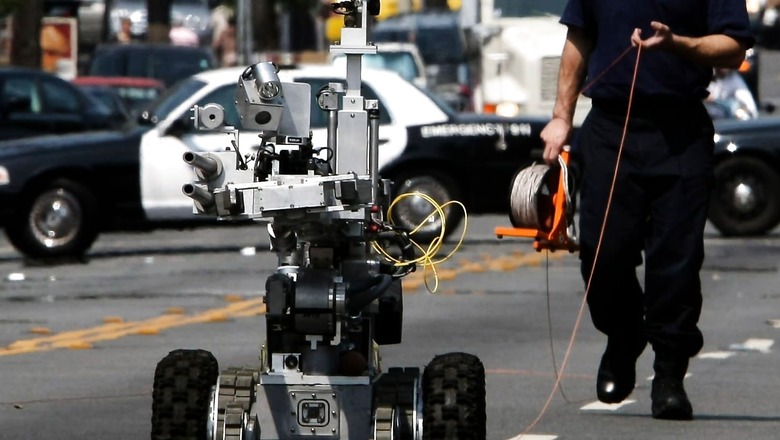
views
With the rapid technological advancements in the past few years, the world noticed China, the US, Japan and South Korea becoming the top countries in terms of the usage of robots. But in India also, many companies are adopting such alternative options to human workers.
India is going through a digital revolution and the robotics sector’s growth is considered quite promising in the country. For example, India’s revenue is expected to grow at a 6.52% annual rate (CAGR 2023-2027), resulting in a market volume of $915.50 million by 2027.
But more use of robots and smart machines could trigger the idea that at some point they will replace humans, making the unemployment issue worse than ever in the country.
The debate
The rise of robots or smart tech has baffled many including now-Twitter boss Elon Musk, who once said: “Robots will be able to do everything better than us.”
Smart machines changing the work environment would be a problem for lower-skilled workers who aren’t able to retrain for new jobs and it could cause lower wages in a world dependent on robots. According to some studies, this could make income equality much worse.
But many economists argue that automation will also create new jobs and to support the growth, IT companies, customer services, and advanced manufacturing industries would hire more employees.
A UN report also stated that AI, 3D printers, and other innovations are generally designed to excel at a very specific set of tasks, and they will rarely be able to substitute an entire occupation.
Take a look around
A 2013 study highlighted that almost half of all jobs in the US are in danger of being automated in the next 20 years including transportation, logistics, and administrative support.
Another study claimed that up to 20 million manufacturing jobs around the world could be replaced by robots by 2030, while about 1.7 million manufacturing jobs have already been lost to robots since 2000, including 400,000 in Europe, 260,000 in the US, and 550,000 in China.
The transformation has been happening in the world more vigorously since the pandemic. According to reports, in the US people were replaced by robots used in restaurants and smart machines checking the temperature at airports.
In North California, toll collectors were replaced by smart machines. Similarly, companies closed call centres employing human customer-service agents and turned to chatbots.
Regarding this, Rob Thomas, senior vice president of cloud and data platform at IBM, earlier said: “I really think this is a new normal–the pandemic accelerated what was going to happen anyway.”
Jobless future?
Considering how India is moving ahead with the adoption of technologies, News18 spoke to a researcher to find out whether such technological advancements will cause a concerning unemployment issue in the future, in a country with a huge working population.
Trisha Ray from Delhi’s Observer Research Foundation (ORF) believes that robots see the most potential in automating tasks that are repetitive, such as stocking shelves, or those that require extensive amounts of time and lead to exhaustion, such as lengthy surgical procedures. But, according to her, such smart tech should also be deployed in a way that protects human dignity.
“Even in a ‘robot’s world’, there is still a role for people. This is true, especially in roles that involve care, such as health workers,” Ray added.
However, she talked about large retailers automating their warehouses and logistics such as Flipkart’s announcement of a Rs 3,600-crore investment for three automated fulfilment centres. She believes that while restricting such investments won’t be the solution, the government can play a role here.
Ray said: “The role of the government is equally to create, strengthen and regularly patch the social safety net to protect those who are most vulnerable and link skilling initiatives with industry demand so that workers can be future-ready. Workforces of the future will have to constantly learn, and update their skills – to an extent, we already see this happening in other emerging tech sectors where professionals must be lifelong students to stay ahead of the curve.”
A policy
The researcher believes that the possible impact may provide a great foundation for Indian policymakers and highlighted the following:
- Those displaced by automation can find other jobs, even if they pay less in the short term, which makes the case for reskilling programmes so that displacement does not result in a worse quality of life for people.
- In South Korea’s case, the Robot Tax may have created a balance between disincentives (taxes) and incentives (lower long-term resource costs) to prevent automation from ravaging the labour market.
According to Ray, it is important to understand that other countries have their own policies, such as National Robotics Initiative in the US, China released its 5-year development plan for the robotics industry, and Japan has New Robot Strategy (2015). So, she pointed out that “one major vacuum we do need to address is our lack of a robotics policy”.
However, the debate over whether robots will cause unemployment issues is not yet settled, and it won’t be until India, as well as other countries, spend a few more years into the automation revolution era to find out the real-time impact across the sectors.
Read all the Latest India News here




















Comments
0 comment